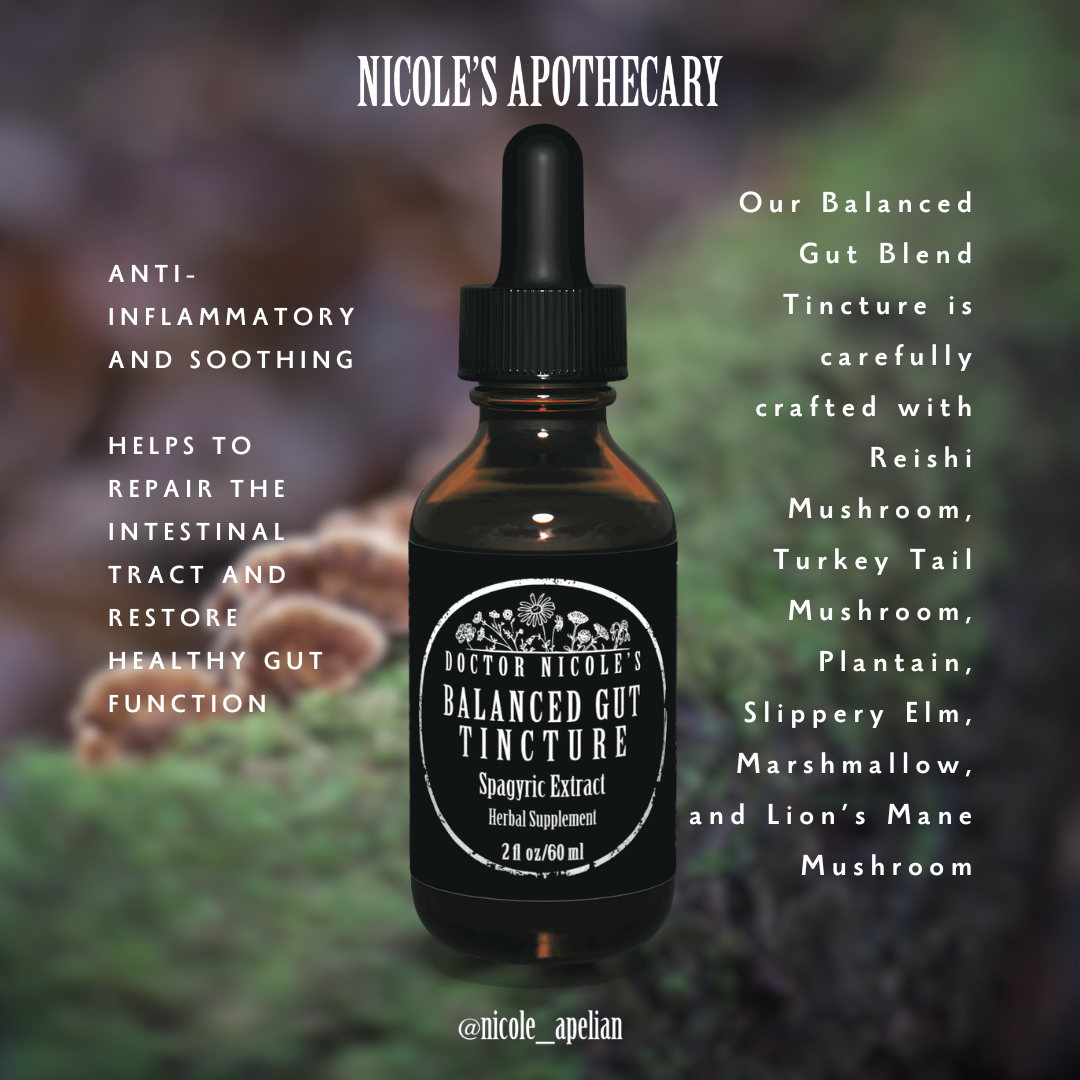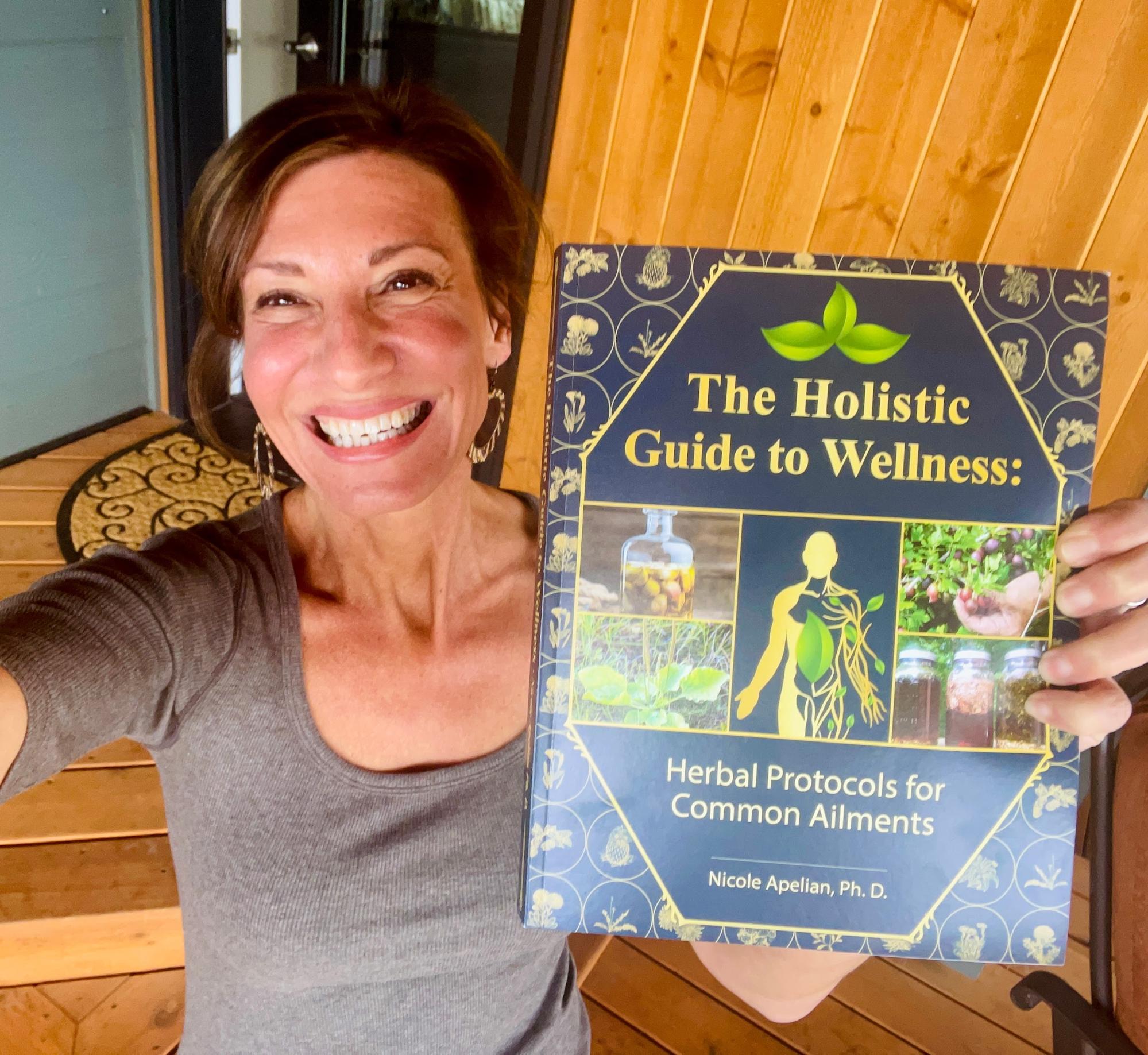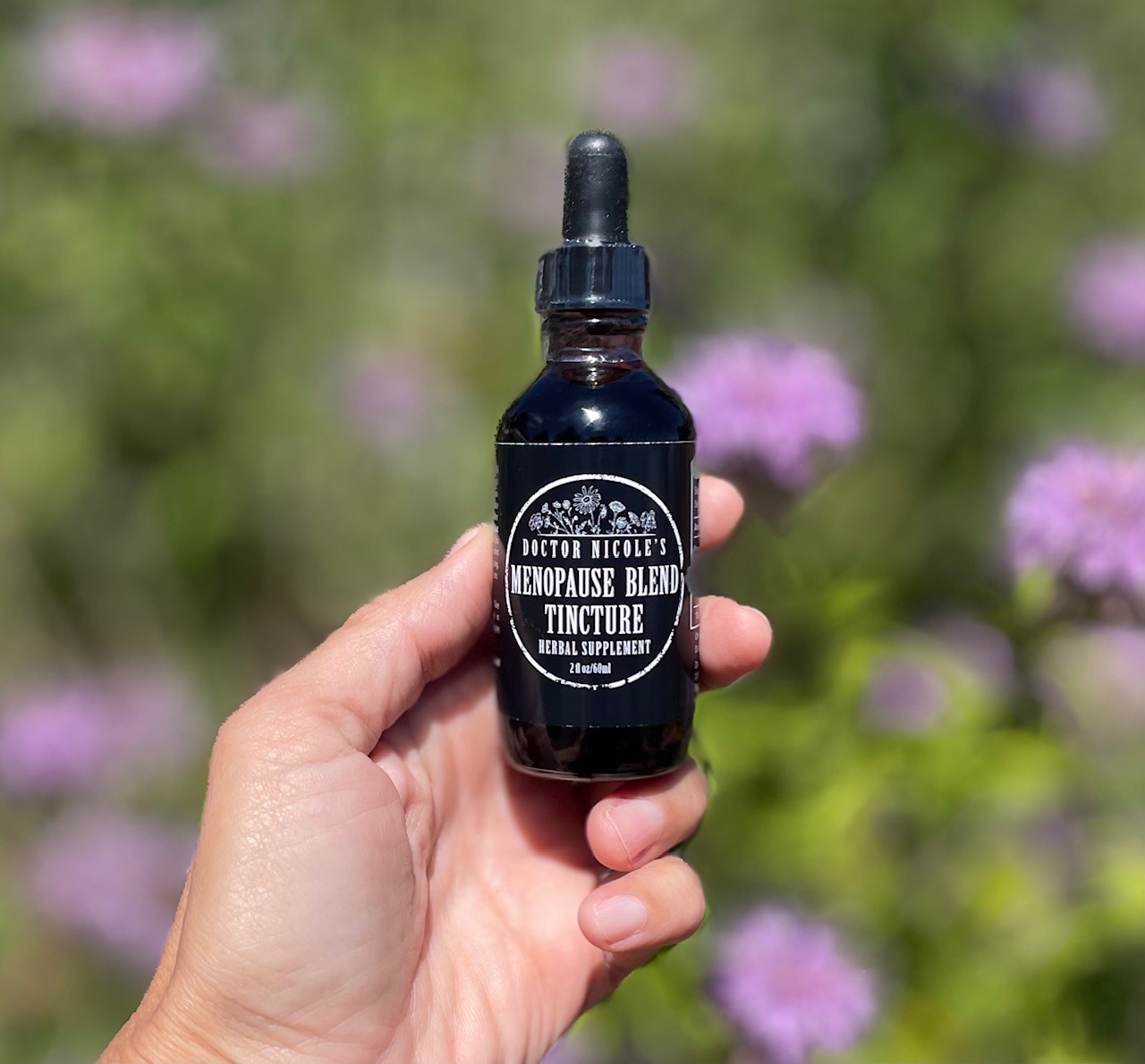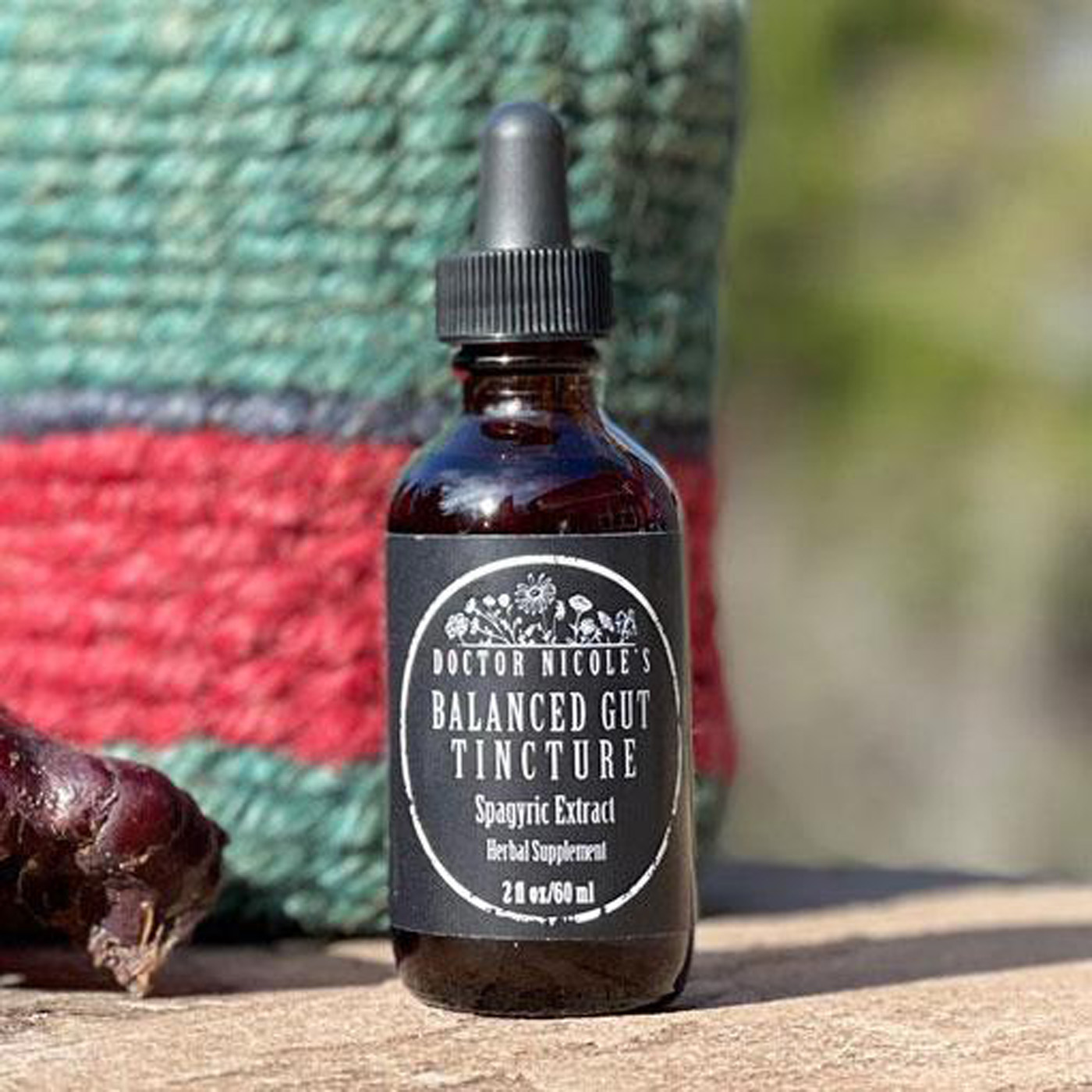Understanding the Gut-Hormone Connection
Menopause marks more than the end of the reproductive years — it’s also associated with a range of symptoms, including hot flashes, night sweats, sleep disturbances, and weight gain — as well as an increased risk of cardiovascular disease and osteoporosis. But that’s not all. This hormonal transition is also closely tied to gastrointestinal issues like bloating, gas, constipation, IBS, and constipation/diarrhea. Additionally, it is linked to changes in the microbiome due to the drop in estrogen and progesterone. This can lead to leaky gut, increased inflammation, and heightened risk of food sensitivities. The good news is there are tangible steps we can take to encourage a healthy gut with simple dietary choices, plus supportive herbal remedies that help you to navigate this time with a sense of balance and empowerment.

The Impacts of a Shifting Hormonal Landscape
Typically when we enter menopause, we tend to be concerned with disruptive symptoms and the long-term health impacts of heart disease and osteoporosis — for good reason! This transition can affect nearly every aspect of daily life, with symptoms like insomnia, brain fog, irritability, and fatigue making it challenging to function at our best. If you have an autoimmune condition, it can complicate an already complex situation further as menopause often triggers inflammation not only in the gut, but also systemically. As I wrote in “Here’s How Menopause Affects Autoimmunity — And How to Find Relief!“:
“With multiple sclerosis, symptoms tend to become worse during and post-menopause. For many between the ages of 45 and 55, low estrogen levels can cause symptoms that are similar to an MS flare.2 A review published in the journal Frontiers in Neurology found that menopause increased physiological and physical symptoms of the disease, including mood disorders, brain fog, sensitivity to heat and/or cold, and inflammation.3 Hot flashes associated with menopause can also intensify and/or trigger flares. Moreover, one small study found that 54 percent of women with MS experienced increased symptoms postmenopausal.”4
One aspect we may not consider is the health of the gut during this hormonal shift — but estrogen and progesterone are closely associated with supporting a robust gut lining as well as a thriving microbiome.1 When levels of these hormones decline, it leads to weakened digestion, dysbiosis, and leaky gut — which in turn can trigger food sensitivities.
With lower levels of these hormones in circulation, there is less bacterial diversity of the microbiome and slower gut motility, resulting in sluggish digestion, weight gain, and higher incidence of constipation. Stomach acid decreases as well, which can lead to acid reflux. Compromised microbial diversity in the gut promotes inflammation and increased gut permeability — otherwise known as “leaky gut”. This is when the gut lining is weakened and undigested food particles and toxins enter into the bloodstream, causing an immune response and food sensitivities.

What You Eat Can Make (or Break) Gut Health
Diet is a powerful tool for counteracting the impacts of menopause on the gut. A high-fiber diet rich in whole grains, legumes, fruits, seeds, nuts, green leafy vegetables, healthy fats, and fermented foods help to reduce inflammation, support the microbiome, and improve gut motility. Prebiotic foods can also be helpful, such as garlic, onions, and leeks; asparagus, dandelion greens, and Jerusalem artichokes; berries, bananas, and apples; oats, barley, and flaxseed. Focus on healthy fats like extra virgin olive oil, coconut oil, avocado oil; chia seeds, almonds, and walnuts; avocado and olives; along with fatty fish such as salmon, sardines, and mackerel.
Seeking additional tips for improving gut health? See my post — “Fertilize Your Gut? You Bet! Here’s How“.
The Takeaway + Herbal Solutions
As we have seen, menopause is more than hot flashes and hormonal shifts — it can significantly impact gut health as well. This hormonal transition is linked to increased bloating, constipation, acid reflux, food sensitivities, and leaky gut — particularly in women with autoimmune conditions. A weakened gut barrier and reduced microbial diversity can trigger systemic inflammation, compounding symptoms and raising the risk of long-term health issues like cardiovascular disease and osteoporosis. The good news? Dietary changes — like eating fiber-rich whole foods, prebiotics, fermented foods, and healthy fats — can help restore gut balance, reduce inflammation, and support overall well-being.
Herbal remedies are also an outstanding ally for gracefully navigating the transition of menopause and beyond. For balancing the female hormonal system, I’ve formulated our Menopause Blend with potent extracts of black cohosh and red clover to address hot flashes, night sweats, insomnia, and anxiety — while also helping to combat bone loss and boost gut microbiota.2
FINALLY FEEL LIKE MYSELF AGAIN!
“Amazing relief and finally a feeling of normality.” -Margie
Next is our Balanced Gut Blend. This powerful formulation combines reishi, turkey tail, and lion’s mane medicinal mushrooms with soothing herbs of slippery elm and marshmallow root to heal and protect your digestive system. It helps ease bloating, addresses leaky gut, and calms food sensitivities, while supporting immune balance, improving cognitive health, and cooling inflammation.
QUICK RESULTS!
“This has definitely helped my gut issues in a fairly quick time. Will definitely continue this in my daily regiment.” -Janet
Looking for comprehensive protocols that cover lifestyle, nutrition, supplements, and herbal support for menopause and leaky gut? My Holistic Guide to Wellness has you covered. In collaboration with leading MDs, NDs, and scientists, I’ve created a collection of 45 easy-to-follow, science-backed holistic protocols designed to help you naturally enhance your health and well-being.
Written in clear, accessible language, this guide empowers anyone — regardless of background — to integrate these tools into daily life and take charge of their wellness journey. With over 30 years of personal experience in natural remedies, combined with expert insights from the field, this book also serves as a valuable desk reference for healthcare professionals — including MDs, NPs, nurses, naturopaths, herbalists, acupuncturists, wellness coaches, and educators seeking to offer more integrative, whole-person care. Tap here for additional details.
Herbal medicine offers powerful, time-tested support to ease your transition through menopause and provide lasting gut health — helping you to not just get by, but truly thrive. Dive deeper into these all-natural solutions by visiting my apothecary and book page today!
Nicole Apelian
Nicole’s Apothecary Products in this Post
References
- “How Gut Health Changes During Menopause and How to Support It” by Jeffrey Mark, M.D., March 29, 2025. https://www.therealgutdoctor.com/how-gut-health-changes-during-menopause/
- Chen, Y. M., Wang, I. L., Zhu, X. Y., Chiu, W. C., & Chiu, Y. S. (2021). Red Clover Iso- flavones Influence Estradiol Concentration, Exercise Performance, and Gut Microbiota in Female Mice. Frontiers in nutrition, 8, 623698. https://doi.org/10.3389/ fnut.2021.623698
- Bove, R., Okai, A., Houtchens, M., Elias-Hamp, B., Lugaresi, A., Hellwig, K., & Kubala Havrdová, E. (2021). Effects of Menopause in Women With Multiple Sclerosis: An Evidence-Based Review. Frontiers in neurology, 12, 554375. https://doi.org/10.3389/fneur.2021.554375
- Smith, R., & Studd, J. W. (1992). A pilot study of the effect upon multiple sclerosis of the menopause, hormone replacement therapy and the menstrual cycle. Journal of the Royal Society of Medicine, 85(10), 612–613. https://doi.org/10.1177/014107689208501008









